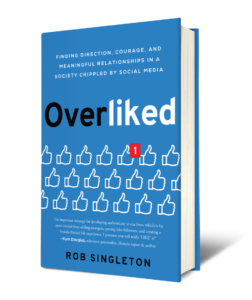Is what we see on social media real? Well, it would seem so. I mean, there are pictures to prove the happy times, right? For some, the pictures are an accurate reflection of the truth behind the scenes. Sadly, though, for many more, the pictures are about as real as Monopoly money. And what it can do to our emotional health can be debilitating.
At its best, engaging in social media can connect us in amazing ways with those we love and care for. At its worst, it leaves us feeling invisible and alone as we shout into the void. Today, I’d like to share about what I refer to as the un-reality of social media.
Social Goggles
Instead of rose-colored glasses, we now view the world through social goggles. Instead of defining our worth by who we are, we have learned to define our worth by how we’re seen by others, by who likes us, or who chooses not to like us. That’s a whole lot of power to give to a bunch of avatars. Yes, the people you are hoping will validate your existence aren’t real. The influencers, the game changers, even your coworker who recently connected with you on LinkedIn, whoever they are online, is not who they are in real life.
Let’s be honest, neither are you. The you that you reveal to the world via Instagram or Facebook is rarely the real you. It is a carefully crafted avatar with curated content, filtered photos, and edited dialogue—a patchwork of your best moments, your coolest vacations, your highlight reels, and your snappiest social media commentary. With the power of technology, you are crafting the person that you long to be—the person who has it all together, or should I say, the persona that has it all together.
People from my parents’ generation recall being afraid that someone might watch them, or that they’d be caught by surprise on camera. Today, young people expect it. In fact, the disorder called scopophobia is the fear of being seen. It is listed by one writer as one of the 10 weirdest phobias that exist, right up there with the fear of the pope (papaphobia), the fear of peanut butter (arachibutyrophobia), and the fear of teenagers (ephebiphobia). Who could imagine being afraid of any of that? Well, I suppose sometimes that teenager one. . .

However, one weird phobia is on the rise. It’s called nomophobia, the fear of being without a mobile device or without cell phone coverage. It’s as frightening as a trip to the dentist or “wedding day jitters.” Psychology Today reports that 65 percent of Americans sleep with their phones beside them, and more than half never switch them off. And all jokes aside, 34 percent of Americans answer their cell phones even during times of intimacy with their partner (thus revealing which “like” they value more), and a growing number of college students even shower with their cell phones.
Even though a growing body of research indicates that people who spend more time on their screens are unhappier than those who are not tethered to their phones, we all tend to live ready. Our phones at our sides, our finger on our camera button, our face ready to . . . thrust neck out, put tongue on roof of mouth, and smize, like Tyra taught us. We know what is like-able, and we do all we can to achieve that standard with each communication.
Our brains are looking for that next dopamine hit. Our hearts are consumed with how we look—almost as though “how we look” will transform our hearts. But God’s word makes it clear that this transformation works not from the outside in but rather the inside out. Proverbs 15:13 says, “A joyful heart makes a cheerful face. But when the heart is sad, the spirit is broken.” So it would seem that, rather than continuing with hearts consumed with how we look, we should be consumed with developing our hearts because a joyful heart has a more transforming effect on how we look than any filter or photoshopping ever could.
What we believe, value, and long for all seep out in our methodical, carefully-timed online revelations. Whether you realize it or not, you have a different identity online. It is the “super” you.
Superhero Cape…or Invisibility Cloak?
While I love the Marvel Cinematic Universe as much as the next guy, the stories are unbelievable. I mean, when you think about a Norse god with golden locks who can call down lightning and save the world with a special hammer…well, it’s not very realistic.
Yet, we love the idea of butt-kicking superheroes. There is no reality behind the myth. No one came out of that movie thinking they were going to run into Captain America grabbing coffee or fly off to Wakanda for the weekend. Superheroes don’t exist. Superpowers are not a thing. No matter how fun they are in the stories we love, they don’t exist in real life.
Whether we realize it or not, our social media avatars are as fake as those superheroes on the screen. Our photos are scrubbed, cropped, and photoshopped. Our style is cool and eclectic. We don’t take a selfie in the mirror to show how bad we look when we roll out of bed on Saturday morning. Our family pics don’t show conflict or stress. (Except when they do, and then we end up on AwkwardFamilyPhotos.com.)
When we do decide to share something “authentic” or “real” online, it almost never is. Our emotions, happy or sad, are portrayed in a way to invite feedback. There is just one problem. None of it is real.

And in our quest for relationship and love? It is difficult to find real connection when everything about us…is fake.
We lose the real story of who we are when we curate ourselves for the benefit of others.
And we get so busy watching the special effects in other people’s lives that we forget to look for the reality behind them. While we are desperately hoping that the “superhero” we are portraying is making us more likable, the opposite effect is happening. In real life, social media can make us invisible. Allow me to explain.
When we post, we are essentially putting our online “friends” in charge of making our voices heard. Rather than talking directly to those close to us about the ins and outs of our days, we essentially shout into the void with a Facebook status or a tweet.
The challenge is that hundreds of thousands of “voices” are shouting at the same time we are. InternetLiveStats.com shows how many posts are created on social media platforms in real time. This ranges from several thousand to hundreds of thousands every second. The void gets exponentially larger by the minute. The chances of our voices being heard among the crowd grows infinitely smaller moment by moment. All the social chatter can leave us feeling unseen and unheard.
Exchanging personal interactions with impersonal posts on social media has a cost. Giving the power to validate or invalidate our thoughts to the online community can take a huge toll on our self-esteem.
So is all hope lost? No, but it does mean turning away from the fake life found in social media and turning to the One who created you. I’m excited to share more on this next Monday as we continue in our blog series about breaking free from the grip of social media and finding authentic relationships—with real people—who like the real you!
